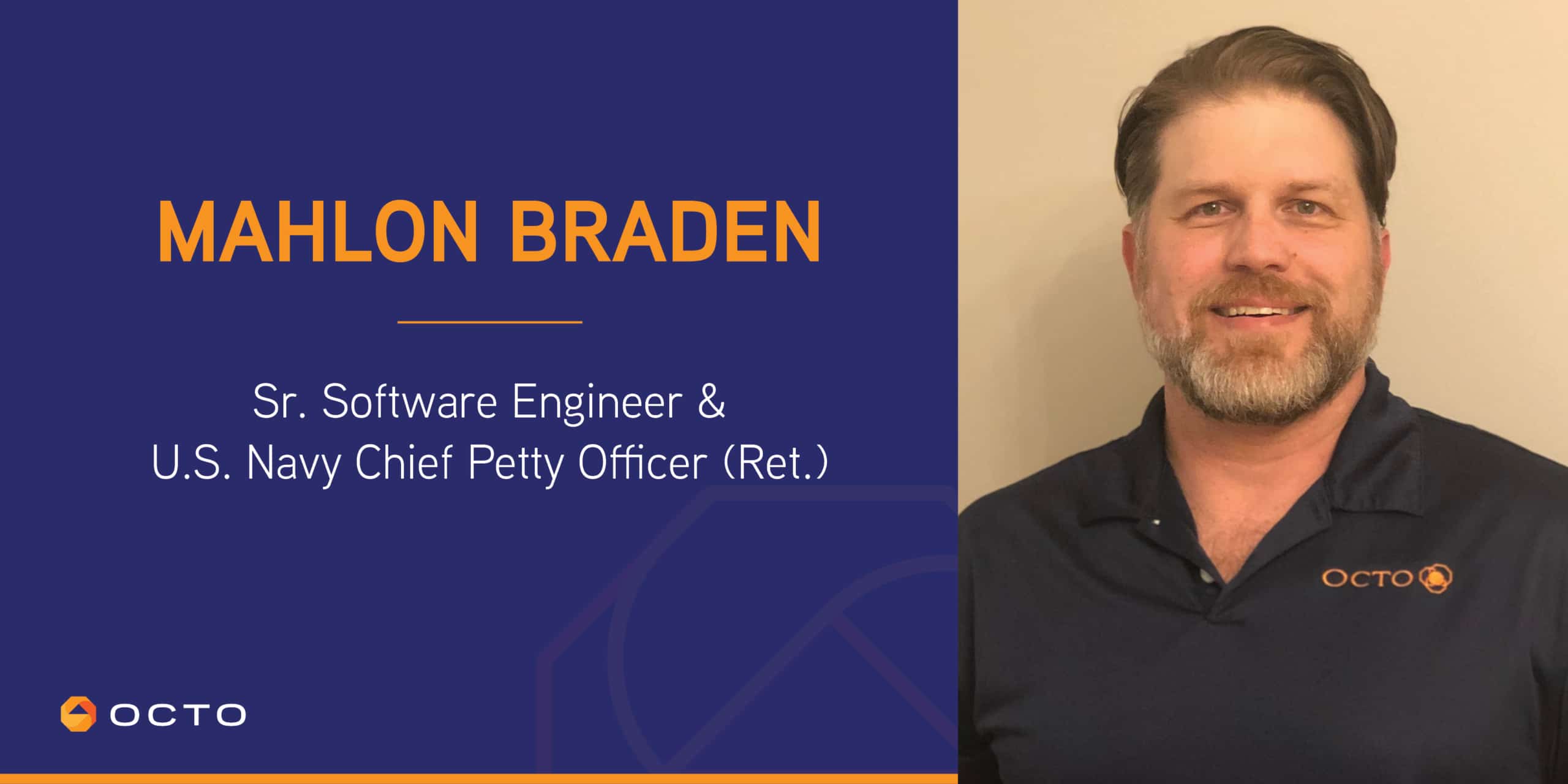
A Q&A with Mahlon Braden, Sr. Software Engineer and U.S. Navy Chief Petty Officer (Ret.)
At Octo, service matters. And the men and women who serve in our military deserve to be honored every day for the sacrifices they have made to protect our nation and defend our freedoms. As November is traditionally Octo’s Salute to Service, honoring veterans and their families, we sat down with our own Senior Software Engineer and Navy Veteran, Mahlon Braden, to learn about his service and how he mentors veterans to help them transition from the military to rewarding careers at Octo.
Q: What is your military background?
A: I served 20 years in the U.S. Navy, working in aviation maintenance, intelligence, and technology. My duties included records and asset management for multiple aircraft types and aviation systems. While working in the intelligence and technology field, I managed networks and operations tasks for various missions and systems to execute national missions for the Department of Defense. In this capacity, I also provided support to the U.S. Army and performed routine assignments for traditional Navy roles. I deployed 10 times – on ships, submarines, in remote duty locations, and to Operation Enduring Freedom and Operation Iraqi Freedom in Afghanistan and Iraq.
Q: In what capacity do you work with transitioning veterans?
A: I believe it’s important to remember to always keep an open avenue to support those who are transitioning because they might be sitting next to you and working with you one day. Since leaving active duty in 2016, I have been fortunate to mentor other service members at their request. Through Octo, I have had opportunities to support job fairs, as well as participate in on-base transition programs such as the Transition Assistance Program (TAP) where mini job fairs and mock interview panels are held. My day-to-day job also partners me with many veterans who are professionals on my teams and in offices that I work in.
Q: Veterans leaving the military for civilian service are often asked to consider what appeals to them about making the change. What are some appealing factors veterans identify?
A: For those looking to move into the civil sector after transitioning, the biggest motivating factor, aside from retirement, is an increase in pay. In the service, the military supplements pay with housing, subsistence, and cost of living allowances based on market areas, where the civilian job market is a bit more consistent and most importantly, competitive. Some veterans who transition after 20 or more years can retire outright based on lifestyle, investments, or family situation, and that is to be applauded. However, most seek out employment after retirement and subsequently enter a profession where the skills gained in the service can be utilized. Others look forward to pursuing something different as they transition. Many veterans use the education assistance earned during service coupled with Veterans Administration (VA) benefits to earn a new certification or attend school for a different degree, allowing them to open new doors and create a new path.
Q: What do veterans often fear about moving from military to civilian positions?
A: Preparing that first resume, being interviewed, fitting in to a new culture or community, having to buy a new wardrobe, and general uncertainty are all common fears. Most service members are either not prepared for these activities or don’t have a readily available answer to these concerns as they decide to transition out of the military.
Q: How do you address the fears listed above?
A: For many people, the tools to overcome these obstacles are available through their location transition assistance office, at their fingertips on the internet, or through transition portals like TAOnline, My Next Move for Veterans, or Career One Stop. My advice to veterans is to attend TAP class early, work on their resume before TAP so they can have a copy on hand, be flexible during the process, and be open to advice from those who have transitioned ahead of them, especially when that advice is from someone in the same career field they are pursuing or a strong established mentor.
Q: What is the best piece of advice you have ever heard given to transitioning veterans?
A: Continue to foster camaraderie in the veteran community and spread it and your core values to wherever you end up post separation.
Q: Anything else you would like to add?
A: As a veteran, it is a point of pride to continue to pay it forward to others. For me personally, it is how I support those who are coming up, not just in the transition phase, but when the opportunity arises to coach and mentor at any point in a career path. Even if it is the individual directly in line behind me, we are instilled to continue passing knowledge down the line, which helps build a better base in preparation, sometimes well in advance of transitioning.
Another great thing about veterans is our ability to network and help solve problems for others based on group knowledge and firsthand experience. An individual may not have all the answers, but the veteran community certainly will, whether it’s guiding someone to an online resource or being that second or third set of eyes on a resume. There is absolutely no reason to reinvent the wheel when established paths for answers to questions can be utilized and reinforced to chart the way through the unknown.
If you are a veteran researching government contracting positions, consider Octo. We are a veteran friendly workplace dedicated to serving the Federal Government and empowering all employees to succeed. Visit our Careers page now.


